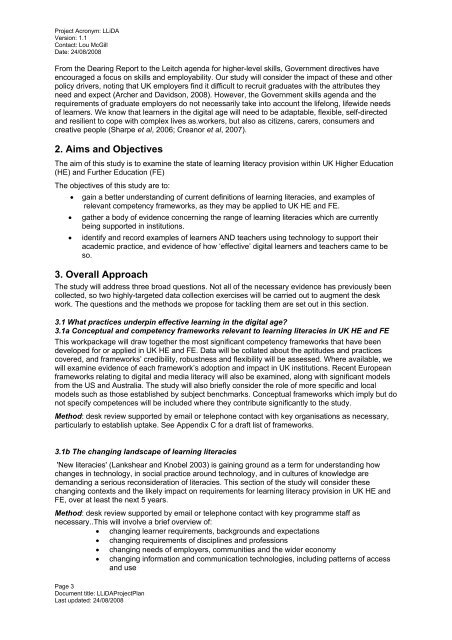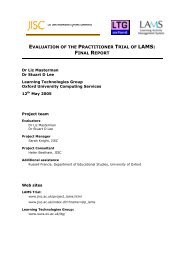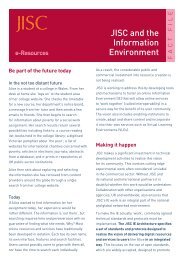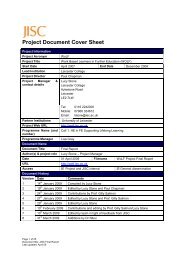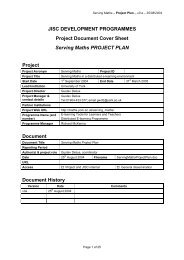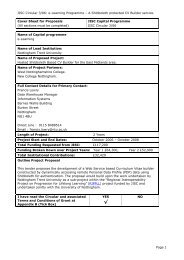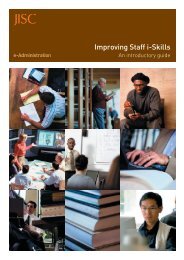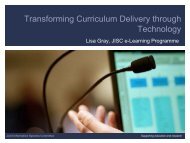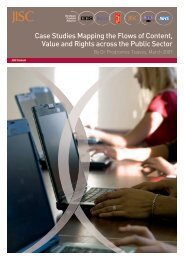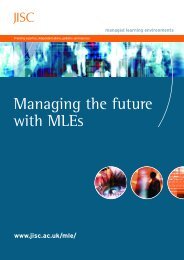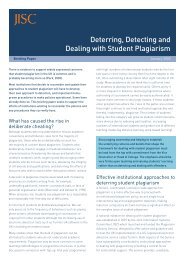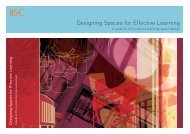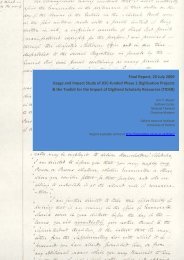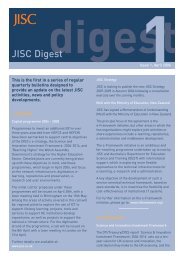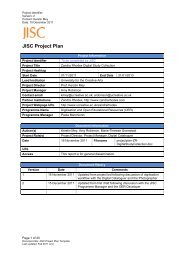LLiDA Project Plan - Jisc
LLiDA Project Plan - Jisc
LLiDA Project Plan - Jisc
Create successful ePaper yourself
Turn your PDF publications into a flip-book with our unique Google optimized e-Paper software.
<strong>Project</strong> Acronym: <strong>LLiDA</strong><br />
Version: 1.1<br />
Contact: Lou McGill<br />
Date: 24/08/2008<br />
From the Dearing Report to the Leitch agenda for higher-level skills, Government directives have<br />
encouraged a focus on skills and employability. Our study will consider the impact of these and other<br />
policy drivers, noting that UK employers find it difficult to recruit graduates with the attributes they<br />
need and expect (Archer and Davidson, 2008). However, the Government skills agenda and the<br />
requirements of graduate employers do not necessarily take into account the lifelong, lifewide needs<br />
of learners. We know that learners in the digital age will need to be adaptable, flexible, self-directed<br />
and resilient to cope with complex lives as.workers, but also as citizens, carers, consumers and<br />
creative people (Sharpe et al, 2006; Creanor et al, 2007).<br />
2. Aims and Objectives<br />
The aim of this study is to examine the state of learning literacy provision within UK Higher Education<br />
(HE) and Further Education (FE)<br />
The objectives of this study are to:<br />
• gain a better understanding of current definitions of learning literacies, and examples of<br />
relevant competency frameworks, as they may be applied to UK HE and FE.<br />
• gather a body of evidence concerning the range of learning literacies which are currently<br />
being supported in institutions.<br />
• identify and record examples of learners AND teachers using technology to support their<br />
academic practice, and evidence of how ‘effective’ digital learners and teachers came to be<br />
so.<br />
3. Overall Approach<br />
The study will address three broad questions. Not all of the necessary evidence has previously been<br />
collected, so two highly-targeted data collection exercises will be carried out to augment the desk<br />
work. The questions and the methods we propose for tackling them are set out in this section.<br />
3.1 What practices underpin effective learning in the digital age?<br />
3.1a Conceptual and competency frameworks relevant to learning literacies in UK HE and FE<br />
This workpackage will draw together the most significant competency frameworks that have been<br />
developed for or applied in UK HE and FE. Data will be collated about the aptitudes and practices<br />
covered, and frameworks’ credibility, robustness and flexibility will be assessed. Where available, we<br />
will examine evidence of each framework’s adoption and impact in UK institutions. Recent European<br />
frameworks relating to digital and media literacy will also be examined, along with significant models<br />
from the US and Australia. The study will also briefly consider the role of more specific and local<br />
models such as those established by subject benchmarks. Conceptual frameworks which imply but do<br />
not specify competences will be included where they contribute significantly to the study.<br />
Method: desk review supported by email or telephone contact with key organisations as necessary,<br />
particularly to establish uptake. See Appendix C for a draft list of frameworks.<br />
3.1b The changing landscape of learning literacies<br />
'New literacies' (Lankshear and Knobel 2003) is gaining ground as a term for understanding how<br />
changes in technology, in social practice around technology, and in cultures of knowledge are<br />
demanding a serious reconsideration of literacies. This section of the study will consider these<br />
changing contexts and the likely impact on requirements for learning literacy provision in UK HE and<br />
FE, over at least the next 5 years.<br />
Method: desk review supported by email or telephone contact with key programme staff as<br />
necessary..This will involve a brief overview of:<br />
• changing learner requirements, backgrounds and expectations<br />
• changing requirements of disciplines and professions<br />
• changing needs of employers, communities and the wider economy<br />
• changing information and communication technologies, including patterns of access<br />
and use<br />
Page 3<br />
Document title: <strong>LLiDA</strong><strong>Project</strong><strong>Plan</strong><br />
Last updated: 24/08/2008


